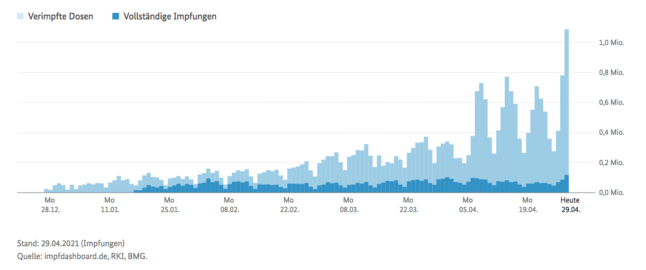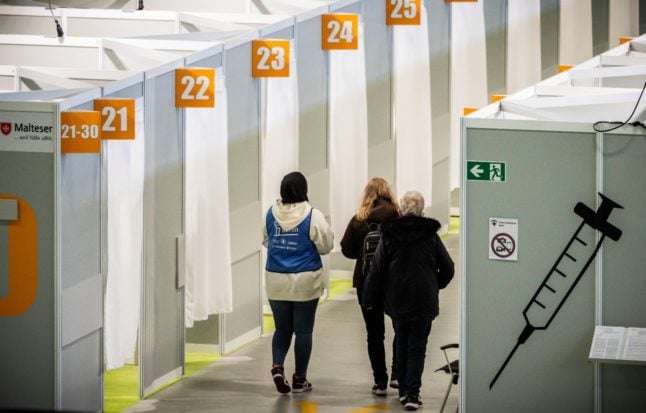With 1.116 million jabs into the arms of Germans on Wednesday, Europe’s biggest economy for the first time vaccinated more than one percent of its population in 24 hours, Spahn said.
“That shows how much speed we’ve gained,” he said of the accelerated inoculation pace after a stuttering start of the campaign late last year.
Only China, India and the United States have so far been able to top that daily inoculation rate.
READ ALSO: These are the Berlin GPs vaccinating non-registered patients
In Europe, Britain had previously held the highest number of jabs in 24 hours – with 874,000 doses given on March 20th.
In all, 21.6 million people or 25.9 percent of the population in Germany have received at least one dose of the vaccine.
It means around every fourth person in the country has received at least one jab.
The graph below on the vaccination dashboard shows how the number of jabs shot up on Wednesday.

The number of first doses of Covid vaccines reported yesterday (970,295) was 52 percent above the previous week’s level. And for the second doses (118,657) the increase is 68 percent compared to last week.
Doctors playing big role in campaign
Of the injections carried out on Wednesday, 729,025 alone were performed by GPs.
Since family doctors were given the green light to carry out vaccinations after Easter, the daily number of jabs has increased massively.
Four states – Berlin, Bavaria, Saxony and Mecklenburg-Western Pomerania – have also dropped the strict priority list for the AstraZeneca vaccine, making it available to all adults after a doctor consultation.
READ ALSO: Can I get the AstraZeneca vaccine in Germany if I’m not on the priority list?
Germans took to social media to talk about the achievement or “Impfrekord” (vaccination record).
Sebastian Dullien, professor for International Economics at HTW Berlin University of Applied Sciences, said Germany was well on its way to achieving what he and a colleague had predicated – vaccinating all over 18s by July 31st.
IMPFREKORD: Gestern wurden 1,1 Mio. Menschen in D gegen #Covid19 geimpft, so viele wie noch nie. Der Impffortschritt liegt damit gut auf dem Pfad, den @AndrewWattEU und ich projiziert hatten, um alle impfwilligen 18+ bis zum 31.7.2021 durchzuimpfen. 1/ pic.twitter.com/r1E741vjkf
— Sebastian Dullien (@SDullien) April 29, 2021
Germany’s campaign had got off to a sluggish start at the end of December 2020 which was put down to EU-wide supply issues for vaccines, as well as bureaucratic hurdles – perhaps caused by different state procedures – and the inflexible vaccination prioritisation list.
However, the rate of vaccinations has picked up in the last few weeks, giving hope of a momentum that will continue as the country is still battling the third wave.
READ ALSO: Bavaria plans vaccines in supermarkets, schools and pharmacies
Chancellor Angela Merkel confirmed earlier this week that Germany plans to lift the priority list in June “at the latest” so every adult will be able to make an appointment then. The aim is to give everyone a first dose by September 21st.
In the same meeting on Monday, Merkel said the German government will put forward a decree to remove some Covid restrictions for fully vaccinated people in Germany.
However, this week some states have already started easing rules for those who have been inoculated.



 Please whitelist us to continue reading.
Please whitelist us to continue reading.
Delighted that Germany has so significantly upgraded its impf rate. Not before time, but now really moving. Use of GPs key. In UK they are really motivated and involve local volunteers. Ironic that GB mentioned for the first time, but delighted with German progress. Too many of my aged German relations have been waiting too long and are at risk.
The only way we win is if the world wins.
This is a fantastic acheivement, but we cant overlook how little are done on the the weekends. The difference between extreemes is about 800K! Germany has really picked up the pace, but must also smooth the curve. I hope to see this once Germany starts recieving a more steady supply.